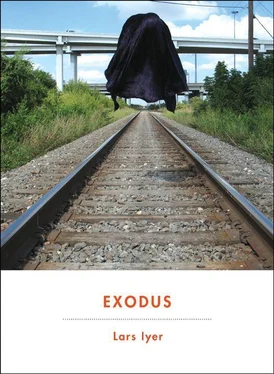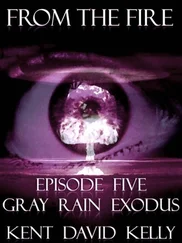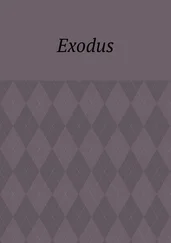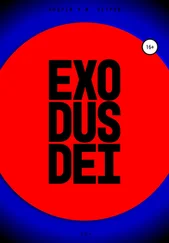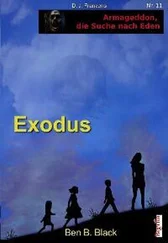We’ll be drinking, W. says. Drinking and weeping by the side of the Thames.
These are the people who rule the world, we muse, as we stand among the commuters on the Docklands light railway. These are the eagles with outspread wings, riding the thermals of international capitalism. These are the eagles immune from it all, from the destruction of the world, and from the suicides that wash up against the towers …
W. reads out his favourite passage from Kraznahorkai, with great vehemence:
They have ruined everything they’ve managed to get their hands on. They’ve managed to get their hands on everything, ruined everything — seized it, ruined it, and carried on in this way until they have achieved complete victory, so that it is one long triumphal march of seizing and ruining …
They have ruined everything, W. whispers, looking round at the commuters. They are destroying the world.
Double red lines along the road. Double yellow lines, those we understand, but double red ones? — ‘Have you ever seen such a thing?’, W. says. It must be because of the terrible volume of traffic, we agree. It must be because of the ceaseless procession of cars and vans.
How crowded the city is! How cramped, with its narrow pavements, and dead-eyed Londoners pushing you onto the street. There’s no space to breathe! The dust, the terrible dust! We’re choking! We’re dying here!
W. is panicking. I sing snatches of our song to soothe him: ‘ Hey, little W.… ’ He sings along, still distraught.
W. has London plague , he says. He needs to leave the capital! We’re men of the provinces, W. says. We’re men of the periphery. But perhaps we might escape London in London, W. says. Perhaps we might escape into London’s periphery.
That’s what the Situationists sought in Paris, W. says. Human freedom, in urban form. A ‘transformed cartography ’ — that’s what they called it. Wasn’t that what they looked for in their dérives , their drifts: the utopia hidden in the city?
Debord and the others drifted for weeks around Paris, W. says. They passed through half-demolished houses and dossed down at night in public gardens, looking to escape ‘ alienation and reification writ in stone ’. They wandered through the caverns and tunnels of the quarries of Paris, and through the catacombs where the sign above the portal read, ‘ Stop! This is the empire of death ’. And they drank — how they drank! — to break their fetters, to usher in the reign of prodigality and glory: a true metropolitanism.
Some places drew them closer, some repelled them; they sank into some routes like fissures, following the cracks in the urban network. They drained into sinkholes and found havens in the drift, temporary stopping places: certain bars, certain quarters. But above all, they moved , and for months at a time. They moved, and the will to change life as it was moved with them. Life as it was, life as it is: they blazed through Paris like a trail of fire …
To move, to move. But where has our London drifting taken us? W. wonders. He reads the sign. The Trafalgar Tavern . To the pub! Where else? Ah, he shouldn’t have put me in charge of the drift, W. says.
W. is dreaming of the Canadian city , he says, over our pints. He’s dreaming of a different kind of urbanism.
Can I imagine what Toronto is like? W. asks. Can I conceive of Montreal, the jewel of Quebec? And Ottawa: what does Ottawa mean to me? He remembers Ottawa, W. says. He has loving memories of Ottawa.
Winnipeg. Edmonton. Yellowknife. Whitehorse …: W. whispers to himself as if incanting. He hasn’t seen these cities, W. says. He can’t imagine them …
The Canadian city is part of the wilderness, W. says; it includes it. To be inside the Canadian city is also to be inside the Canadian wilderness, he says mystically. The Canadian city is only a fold of the wilderness, a way of answering it, of continuing it in another medium.
The Canadian city is full of space, W. says. Its boulevards remember the ice-plains, its skyscrapers the gleaming summits among the mountains. Its windows flash back the aurora borealis to the sky. And its night-time darkness remembers that of the thick pine forests that cover the land.
And the Canadian city is full of time , W. says. Everyone has time. People — strangers — stop and talk to one another. The Canadians are a patient people, W. says. They’re not to be rushed.
The Canadian city: that’s where we would learn what patience was, W. says. That’s where we would learn to take deep breaths and walk upright. — ‘Even you! Even you might learn to take deep breaths and walk upright’.
And I might learn French, too, W. says. That’s where he learned his French, in Canada, W. says. He grew up speaking French, Canadian French. The French of the Quebecois, he says. The French of the wilderness.
That’s how you can calm a wilderness bear, W. says: by speaking to it in Quebecois French. That’s how you can calm a wilderness wolf: by speaking softly, in a language full of space and time …
The hotel bar.
We need to work! W. says. To think! But our minds are blank. We sit back in our chairs. We stretch our arms, then our legs. W. yawns and then I yawn. W. gets up and goes to the loo, and then I get up and go to the loo. Should we get something else to drink? I wonder. Nothing else! We’re here to think , not drink , W. says.
We pause to finish the dregs of our pints and look around the bar. Do they sell pork scratchings? we wonder. W. sends me to the bar to ask about pork scratchings. — ‘Fuck off and let me think’.
I come back with two more pints. W.’s still stuck. We rub our bellies with our hands and then pat the tops of our heads. Then we pat our bellies and rub the tops of our heads.
Inspiration! A thought’s come to him, W. says. A thought prompted by Kierkegaard! — ‘Take dictation! We refuse to confront the real object of our despair’, W. says, ‘We inflict despair on ourselves’. And then, ‘We have to become conscious of our despair: that we are each both the subject and the object of our despair’.
Hasn’t he always blamed me for his despair? W. says. Hasn’t he always assumed that it’s all my fault? If only I could be rid of Lars, that idiot , he’s said to himself. If only I could ditch Lars somewhere …
But what if it isn’t all my fault? What if the fault lies with W. himself? ‘ Despair is the gateway to the eternal ’, W. reads from his copy of The Sickness Unto Death . ‘ Salvation will come, but only when we choose despair ’: that’s what Kierkegaard writes, W. says.
Has W. chosen despair: can he really say that? he wonders. Has W. chosen me , the chief cause of his despair? Because that’s what he must do, if he wants salvation. I, who am W.’s obstacle, am also his gateway. I, who block W.’s path, am also nothing other than his path.
It’s not enough to say ‘no’ to me, W. says; he has to say ‘yes’, too. It was by embracing the leper he met on the highway that St Francis began his life as a mendicant. W. will have to embrace me, and then be embraced , not by me, who am not capable of embracing anyone, but by the Power that stands behind us both, testing us both, W. says.
Stuck again. W. looks into the air. He grinds his teeth. He clenches his fists, then unclenches them. Then he sees me looking at him. — ‘You enjoy this, don’t you?’, W. says. I enjoy watching him groping for thought .
W. thinks of his other collaborators, over the years. Of others in whom he had placed his hopes. One by one, they were picked off by careerism, by laziness, by the temptations of applied ethics and the writing of introductory books.
Читать дальше
